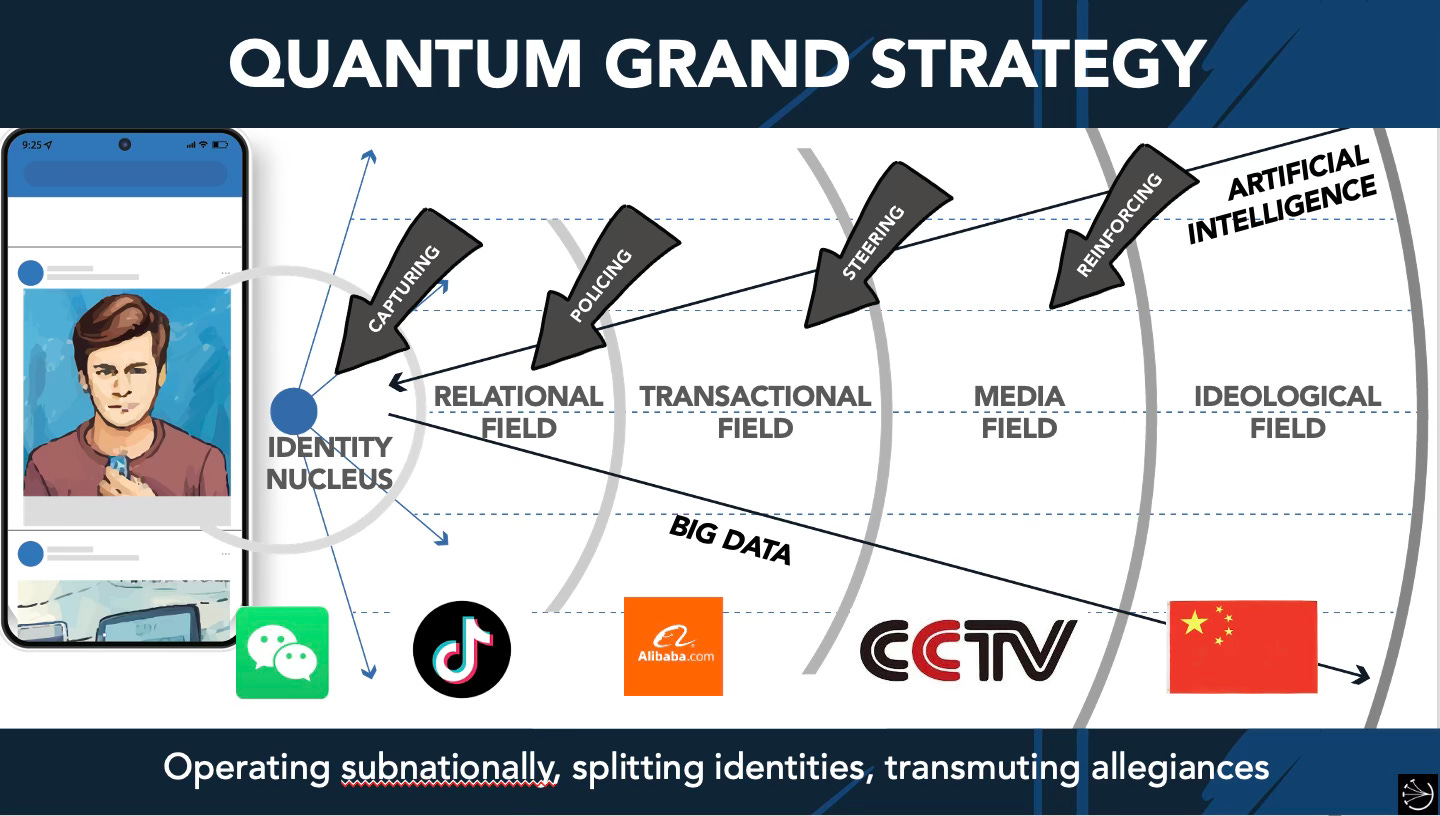I am a big believer in storytelling.
From America’s New Map:
Americans do not endure history; we make it. This is our true superpower: reliably resetting our internal rules in response to history’s punishing waves of change, and then spreading those new and better rules across the world. American grand strategy does not merely confront rivals but shapes a global environment that tames their—and our—worst impulses. We are the best thing to ever happen to our world.
Russia and China aggressively market their competing rulesets, exploiting vulnerable trade partners who distrust and dislike them. Yet both regimes, as internally brittle as they are, currently outpace America’s half-hearted attempts at global leadership. How is this so? It is because the stories we now tell of globalization do not envision a happy ending, much less a way ahead. No surprise there: when creators abandon their creation, monsters abound.
My task here is to propose that happy ending, one avowedly cast from an American perspective. Your task, as reader, is to maintain an open mind as to its feasibility and desirability. If, as our politicians love to proclaim, America’s best days lie ahead, then we citizens cannot merely await that future but must craft its story lines—both foreign and domestic. Given our truly revolutionary achievements, we must not allow our currently flat trajectory to determine the upper bounds of our ingenuity and ambition, both of which the world desperately needs now.
Right now, America’s story to the world is overwhelmingly negative and aggrieved. It promises revenge for past mistreatment. It is entirely zero-sum in its perspective (I can only win if you lose!). It speaks of exclusion and the restoration of past inequities in our favor. It is an American Dream alright, but now narrowed down to only Americans — and the right kind of Americans, at that.
As such, it is not a hard story to beat, which China seeks to systematically achieve.
I have described China’s “quantum grand strategy” here before:
Blast from the Past: China’s quantum grand strategy
As a Saturday chill read, I repost my article for India’s Economic Times Featured Insights from a year ago. It is my best and most cogent expression of China’s current grand strategy as I recognize it.
To remind: we start with the reality that America and China view the world very differently. America sees a world of military showdowns — scary rounds of poker that must be won, lest credibility be lost. China sees a global Go board and wants to lay its stones everywhere it can to constrict American influence and cement its own.
That “cementing” process is literal — China’s Belt and Road Initiative. It is my SysAdmin force realized from The Pentagon’s New Map.
SysAdmin/System Administrators
The “second half” blended force that wages the peace after the Leviathan force has successfully waged war. Therefore, it is a force optimized for such categories of operations as “stability and support operations” (SASO), postconflict stabilization and reconstruction operations, “humanitarian assistance/disaster relief” (HA/DR), and any and all operations associated with low-intensity conflict (LIC), counterinsurgency operations (COIN), and small-scale crisis response. Beyond such military-intensive activities, the SysAdmin force likewise provides civil security with its police component, as well as civilian personnel with expertise in rebuilding networks, infrastructure, and social and political institutions. While the core security and logistical capabilities are derived from uniformed military components, the SysAdmin force is fundamentally envisioned as a standing capacity for interagency (i.e., among various U.S. federal agencies) and international collaboration in nation-building, meaning that both the SysAdmin force and function end up being more civilian than uniform in composition, more government-wide than just Defense Department, more rest-of-the-world than just the United States, and more private-sector-invested than public-sector-funded.
Except China’s package is more subtle. Its intervention is incremental. It STARTS with connectivity instead of destruction (e.g., regime toppling). Its security angles are subtle and largely hidden from view, and VERY friendly to the local regime’s desire to maintain social control. China is all about connecting your economy and society and networks to a mini-globalization dominated by Beijing’s storylines, perspectives, and beliefs. As an economic deal, it is hard to turn down.
China doesn’t just promise connectivity to the global economy; it delivers it — tangibly. It knows you want this connectivity and so it almost gives it away with a casual, Oh you can pay me back later(!) vibe.
And yes, you will be in their debt, but more so you’ll be trapped in their information/data webs. Your world vision will be Beijing’s world vision, spoon-fed to your citizenry from all possible angles.
China wants to know your citizens — one by one. They want to capture their identities, their communications, their purchases, their media feeds, and, in capturing all that big data and using it to improve and empower their AI models, they want to condition your behavior in a truly ambitious manner.
When the Americans show up — usually in force, we’re there to find and neutralize the bad guys. We run toward the boom and deliver plenty of our own (increasingly with drones).
China works left of boom: it wants inside that bad actor’s head so it can identify and neutralize them long before they get to their action stage.
China’s ultimate goal — beyond capturing all that big data and ruling your Internet of Things and fueling their AI of Things — is to get your citizens to police themselves, less at your government’s command or enforcement and more at their own conditioning: Do that and your existence narrows, but do this and it expands with your ambitions!
In truth, that sale and that story is very familiar to us in the West, as it is essentially commercial advertising (Drink Coke and your world is fabulous and you can do anything!). The closest things we have to negative conditioning are Public Service Announcements (This is your brain on drugs!) and the like. They tend to hector us and so we mostly tune them out.
China’s storytelling burrows far deeper inside your head because it is so immediate and persistent and obvious: This feels good so I do more of this, while that feels bad so I engage in less of that.
China’s preferred model of score-keeping is likewise immediate and persistent and pervasive. Likes go up or likes go down. It does not lecture; it simply makes clear the consequences.
It is a powerful model, because it taps into the modern world’s ability to provide us all with seemingly infinite variations of identity. We can pick and choose how to represent ourselves — increasingly in virtual realms, where the conditioning can be suitably immersive and thus that much more powerful in impact.
In our technologically advancing world, we naturally raise generations of people who, thanks to being digital natives, are brain-wired for this kind of capture and manipulation.
Which gets me to this fascinating bit of research (h/t Tom Zorc):
CHOICE: China’s Narrative Warfare in Africa: Influence and Mechanisms
The Chinese Communist Party (CCP) is frustrated that its economic and military power has not translated into significant political influence on the international stage, which it attributes to the West’s narrative hegemony and its impact on global governance, values, and norms. As a result, China acknowledges the strategic importance of narratives in shaping global perceptions and enhancing its image, as encapsulated in the concepts of “narrative warfare” and “narrative power,” the latter referring to the ability to shape the global order to one’s advantage by promoting an alternative vision of this very order.
China’s messaging almost writes itself in reply to recent American actions: We are the stable ones, they are not! We are the fair ones, they just want to settle all scores in their favor! They criticize, but we build!
Unable to confront the West directly, China has sought to erode its narrative hegemony by gaining influence in the Global South. The CCP deploys narratives to manipulate the information environment in support of its broader agenda – a strategy elevated to a top priority in Xi Jinping’s 2013 speech on national image building. These narratives frame global events as a rivalry between traditional and emerging powers, the former portrayed as colonial actors that have harmed and continue to exploit the Global South, and the latter, including China, as fair and loyal partners. They also emphasize economic partnerships through themes of “mutual benefit,” “non-interference,” “South-South cooperation,” and “win-win cooperation,” constructing a façade of positive development while promoting authoritarian governance norms and anti-democratic sentiments.
Again, China’s messaging to the Global South could hardly be more clear: Theirs is a zero-sum transaction where you must lose so they can win! They deliver neo-colonialism while we bring you into globalization! We will help you stabilize your country while they want to keep you forever in conflict and tumult!
Beijing’s narrative warfare operates across multiple domains, each employing specific mechanisms to foster an environment conducive to the adoption of Chinese narratives while discouraging open opposition. The goal is to achieve perception dominance – the ability to influence and control how situations, events, and narratives are interpreted by others.
The story goes on to list the various methods and mechanisms, starting with the old communist standby of party-to-party relations. But that’s just the cash register where Beijing rings you up after it has sold you on so many levels.
China expands its media presence, allowing it to shape your citizenry’s perceptions.
But here’s where the rubber truly meets the road in our Information Age:
Digital Expansion: Controlling the Information Space
Another mechanism through which Beijing fosters local conditions for the acceptance of its strategic narratives is the export of Chinese information and communications technology (ICT). In this way, Beijing promotes digital authoritarianism focused on the provision of digital infrastructure that can be used to suppress freedom of expression and dissent. Chinese technology, combined with governance norms, enable the control of information space through online censorship, including website blocking and Internet shutdowns during elections or other political events.
In this realm, the Belt and Road Initiative is a powerful tool, but it’s the less-talked about Digital Silk Road that secures the ideological win:
The Digital Silk Road, announced in 2017, is a response to the perceived Western dominance in global ICT infrastructure, which the Chinese leadership equates with “network hegemony” of the US. As a consequence, the ICT industry is frequently mobilized to enhance China’s national power by creating a new tech infrastructure favorable to Beijing, believed to be critical for maintaining Chinese core values and controlling its strategic narratives.
Ultimately, China seeks to embed its police and security capabilities and even its officers within your police system — co-policing, if you will.
It is a brilliant model that skips over the military intervention and jumps straight toward the police intervention, because, why fight a war if you can win the battle through other means?
Beijing cannot believe its good fortune with Trump’s return to power: He is destroying America’s countering capabilities like State, USAID, Voice of America, etc. We are effectively abandoning the field of play, which, from Beijing’s perspective, must feel like a mandate from heaven.
I don’t know about you, but Trump 2.0 doesn’t feel like winning to me.














